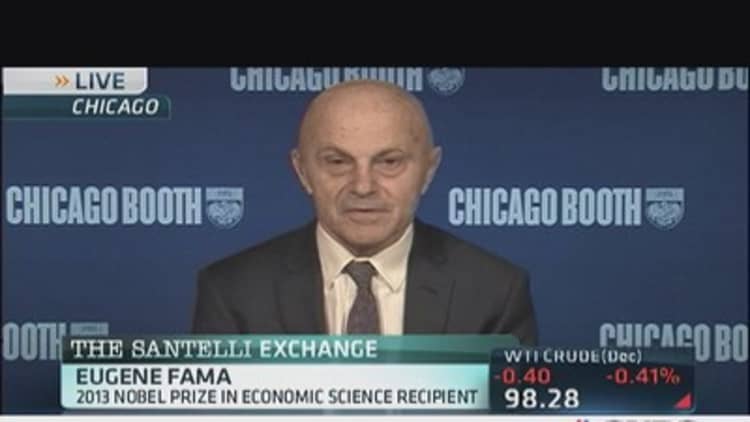Since quantitative easing's launch, economists have fretted it might spur runaway inflation, but now at least one economist is questioning whether central banks' asset purchases might lead to deflation instead.
"Unproductive investment is by nature ultimately deflationary. This is a point also worth recalling when investing in paper assets fuelled by QE liquidity and not underpinned by sustainable economic growth," Michala Marcussen, global head of economics at Societe Generale, said in a note.
"In theory, a permanent increase in money supply results in a proportional increase in all money prices," Marcussen said. But she added that the inflation impact of central banks' asset buying may only be temporary as the assets will later either be sold to private investors or redeemed.
(Read more: Fed could up QE to $1 trillion a month: Marc Faber)

One unintended consequence of developed markets' QE has been significant capital inflows to emerging economies, and in China, the liquidity combined with the domestic government's policies to spur fixed asset investments, she noted.
"This led initially to a welcome demand boost for commodities and a wide variety of capex goods. Today, however, the result is that China suffers significant excess capacity and poor capital returns, not to mention a shaky shadow banking system," she said.
"Excess capacity is deflationary and the means to deal with it is to shut it down. Indeed, we expect China for now to exert deflationary pressure on the global economy."
(Read more: QE Infinity? No end in sight for money printing)
In other emerging markets, such as Brazil and India, QE affected the demand side, via consumer credit channels, she noted. While local currency appreciation initially masked the inflationary effects, talk earlier this year that the U.S. Federal Reserve may begin tapering its asset purchases caused local currencies to depreciate even as growth momentum slowed, she noted.
"We do not expect to see these inflationary forces exported. As households struggle to deleverage balance sheets, the end result, however, could prove deflationary," she said.
(Read more: It's 'too tender a moment' to cut QE, says Fed hawk Fisher)
To be sure, other economists aren't convinced.
While data on Thursday showed euro zone inflation fell to a four-year low of 0.7 percent on year in October, it may not offer much support for the view QE is damping inflation.
"They have a lot of the key economies going through austerity measures, so the lower inflation outcome may not be solely due to a lot of QE," noted Alvin Liew, senior economist at UOB in Singapore.
(Read more: QE expected tocontinue through 2014: CNBC survey)
Since peripheral European economies using the euro can't allow their currency to depreciate to match weak economic conditions, domestic prices there must fall to match low growth expectations, noted Leif Eskesen, an economist at HSBC.
It's also not clear the assets purchases are "unproductive."
(Read more: Almost everyone is misreading Fed's new QE study)
Central banks are also targeting mortgages, noted Eskesen. "It's helping to keep interest rates low. It's helping to keep the yield curve flat," he said. "It encourages, to some extent, more lending and risk taking," helping to support the demand side, he said, adding QE may have helped avert deflation.
"I severely doubt inflation expectations would have been higher in the absence of QE," added Robert Prior-Wandesforde, an economist at Credit Suisse. But he noted a better question would be whether QE is having any real impact on economic activity. "It's not at all clear it's boosting investment at all, let alone unproductive investment," Prior-Wandesforde said. He noted banks are lending cautiously, making the chances of lending to unproductive enterprises consequently smaller.
But he added, the QE-driven liquidity is pumping up asset prices that could suffer when the liquidity is withdrawn. "Bubble turning to bust has a reasonable probability and the bust could ultimately lead to deflation, but that's a second- or third-round effect and one that is unlikely," he said.
— By CNBC's Leslie Shaffer. Follow her on Twitter: @LeslieShaffer1

